
Since 1997, when it ceased to be the last major colonial holding of Great Britain, Hong Kong has been a part of the People’s Republic of China, while maintaining a distinct political and legal system. In February, an unpopular bill was introduced that would make it possible to extradite fugitives in Hong Kong to countries that the Hong Kong government has no existing extradition agreements with—including mainland China. On June 9, over a million people took the streets in protest; on June 12, protesters engaged in pitched confrontations with police; on June 16, two million people participated in one of the biggest marches in the city’s history. The following interview with an anarchist collective in Hong Kong explores the context of this wave of unrest. Our correspondents draw on over a decade of experience in the previous social movements in an effort to come to terms with the motivations that drive the participants, and elaborate upon the new forms of organization and subjectivation that define this new sequence of struggle.
In the United States, the most recent popular struggles have cohered around resisting Donald Trump and the extreme right. In France, the Gilets Jaunes movement drew anarchists, leftists, and far-right nationalists into the streets against Macron’s centrist government and each other. In Hong Kong, we see a social movement against a state governed by the authoritarian left. What challenges do opponents of capitalism and the state face in this context? How can we outflank nationalists, neoliberals, and pacifists who seek to control and exploit our movements?
As China extends its reach, competing with the United States and European Union for global hegemony, it is important to experiment with models of resistance against the political model it represents, while taking care to prevent neoliberals and reactionaries from capitalizing on popular opposition to the authoritarian left. Anarchists in Hong Kong are uniquely positioned to comment on this.
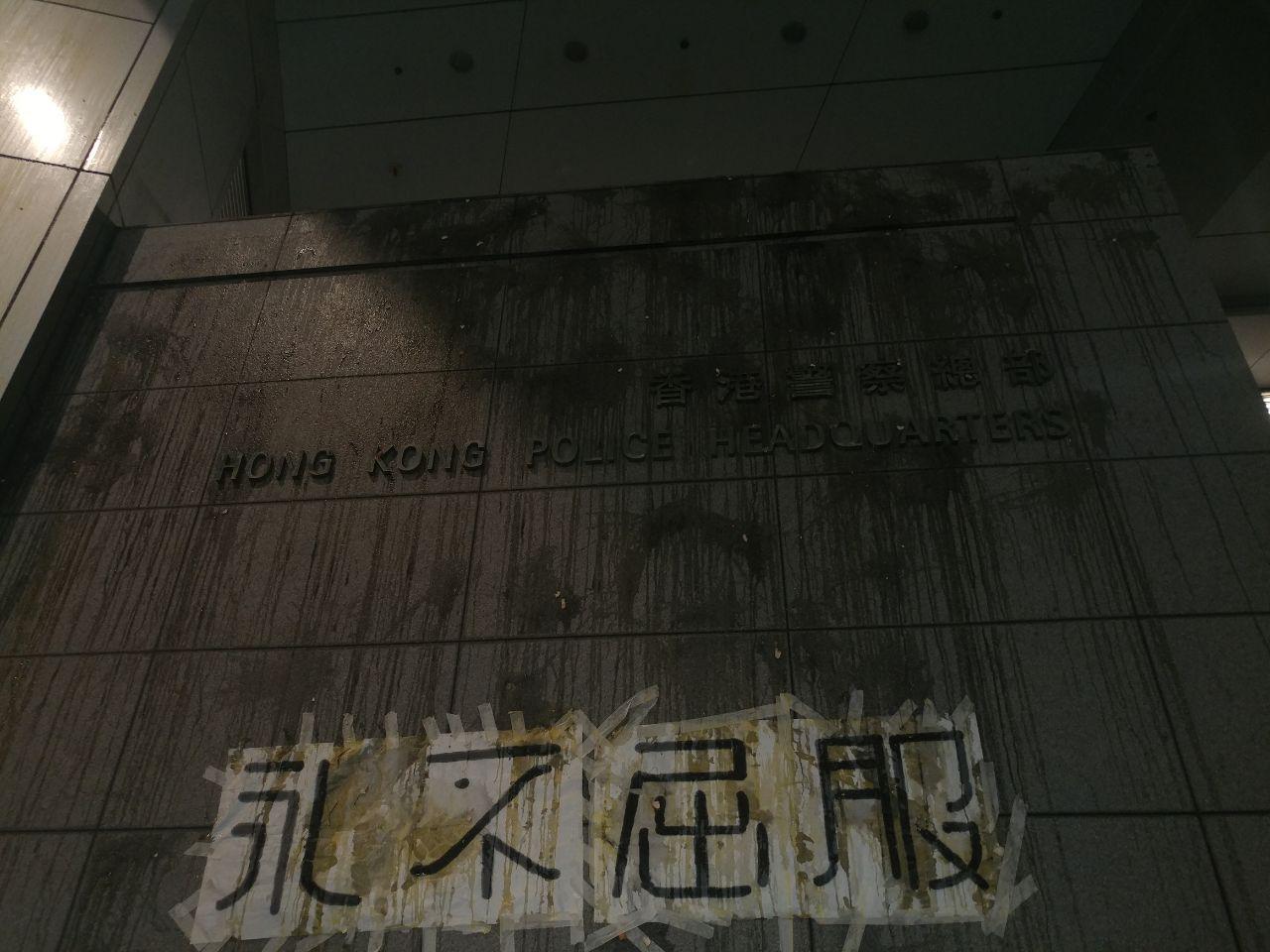
The front façade of the Hong Kong Police headquarters in Wan Chai, covered in egg yolks on the evening of June 21. Hundreds of protesters sealed the entrance, demanding the unconditional release of every person that has been arrested in relation to the struggle thus far. The banner below reads “Never Surrender.” Photo by KWBB from Tak Cheong Lane Collective.
“The left” is institutionalized and ineffectual in Hong Kong. Generally, the “scholarist” liberals and “citizenist” right-wingers have a chokehold over the narrative whenever protests break out, especially when mainland China is involved.
In the struggle against the extradition bill, has the escalation in tactics made it difficult for those factions to represent or manage “the movement”? Has the revolt exceeded or undermined their capacity to shape the discourse? Do the events of the past month herald similar developments in the future, or has this been a common subterranean theme in popular unrest in Hong Kong already?
We think it’s important for everyone to understand that—thus far—what has happened cannot be properly understood to be “a movement.” It’s far too inchoate for that. What I mean is that, unlike the so-called “Umbrella Movement,” which escaped the control of its founding architects (the intellectuals who announced “Occupy Central With Love And Peace” a year in advance) very early on while adhering for the most part to the pacifistic, citizenist principles that they outlined, there is no real guiding narrative uniting the events that have transpired so far, no foundational credo that authorizes—or sanctifies—certain forms of action while proscribing others in order to cultivate a spectacular, exemplary façade that can be photographed and broadcast to screens around the world.
The short answer to your question, then, is… yes, thus far, nobody is authorized to speak on behalf of the movement. Everybody is scrambling to come to terms with a nascent form of subjectivity that is taking shape before us, now that the formal figureheads of the tendencies you referenced have been crushed and largely marginalized. That includes the “scholarist” fraction of the students, now known as “Demosisto,” and the right-wing “nativists,” both of which were disqualified from participating in the legislative council after being voted in.
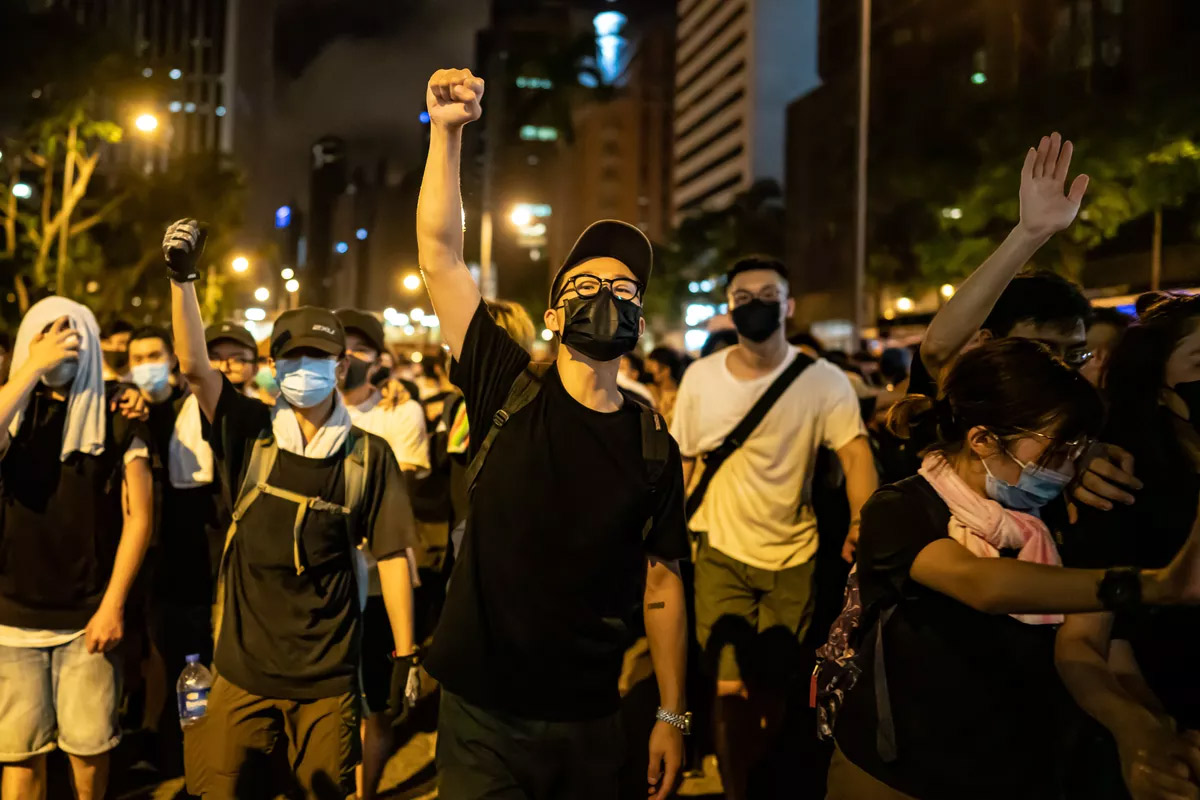
Throughout this interview, we will attempt to describe our own intuitions about what this embryonic form of subjectivity looks like and the conditions from which it originates. But these are only tentative. Whatever is going on, we can say that it emerges from within a field from which the visible, recognized protagonists of previous sequences, including political parties, student bodies, and right-wing and populist groups, have all been vanquished or discredited. It is a field populated with shadows, haunted by shades, echoes, and murmurs. As of now, center stage remains empty.
This means that the more prevalent “default” modes of understanding are invoked to fill the gaps. Often, it appears that we are set for an unfortunate reprisal of the sequence that played itself out in the Umbrella Movement:
- appalling show of police force
- public outrage manifests itself in huge marches and subsequent occupations, organized and understood as sanctimonious displays of civil virtue
- these occupations ossify into tense, puritanical, and paranoid encampments obsessed with policing behavior to keep it in line with the prescribed script
- the movement collapses, leading to five years of disenchantment among young people who do not have the means to understand their failure to achieve universal suffrage as anything less than abject defeat.
Of course, this is just a cursory description of the Umbrella Movement of five years ago—and even then, there was a considerable amount of “excess”: novel and emancipatory practices and encounters that the official narrative could not account for. These experiences should be retrieved and recovered, though this is not the time or place for that. What we face now is another exercise in mystification, in which the protocols that come into operation every time the social fabric enters a crisis may foreclose the possibilities that are opening up. It would be premature to suggest that this is about to happen, however.
In our cursory and often extremely unpleasant perusals of Western far-left social media, we have noticed that all too often, the intelligence falls victim to our penchant to run the rule over this or that struggle. So much of what passes for “commentary” tends to fall on either side of two poles—impassioned acclamation of the power of the proletarian intelligence or cynical denunciation of its populist recuperation. None of us can bear the suspense of having to suspend our judgment on something outside our ken, and we hasten to find someone who can formalize this unwieldy mass of information into a rubric that we can comprehend and digest, in order that we can express our support or apprehension.
We have no real answers for anybody who wants to know whether they should care about what’s going on in Hong Kong as opposed to, say, France, Algeria, Sudan. But we can plead with those who are interested in understanding what’s happening to take the time to develop an understanding of this city. Though we don’t entirely share their politics and have some quibbles with the facts presented therein, we endorse any coverage of events in Hong Kong that Ultra, Nao, and Chuang have offered over the years to the English-speaking world. Ultra’s piece on the Umbrella Movement is likely the best account of the events currently available.
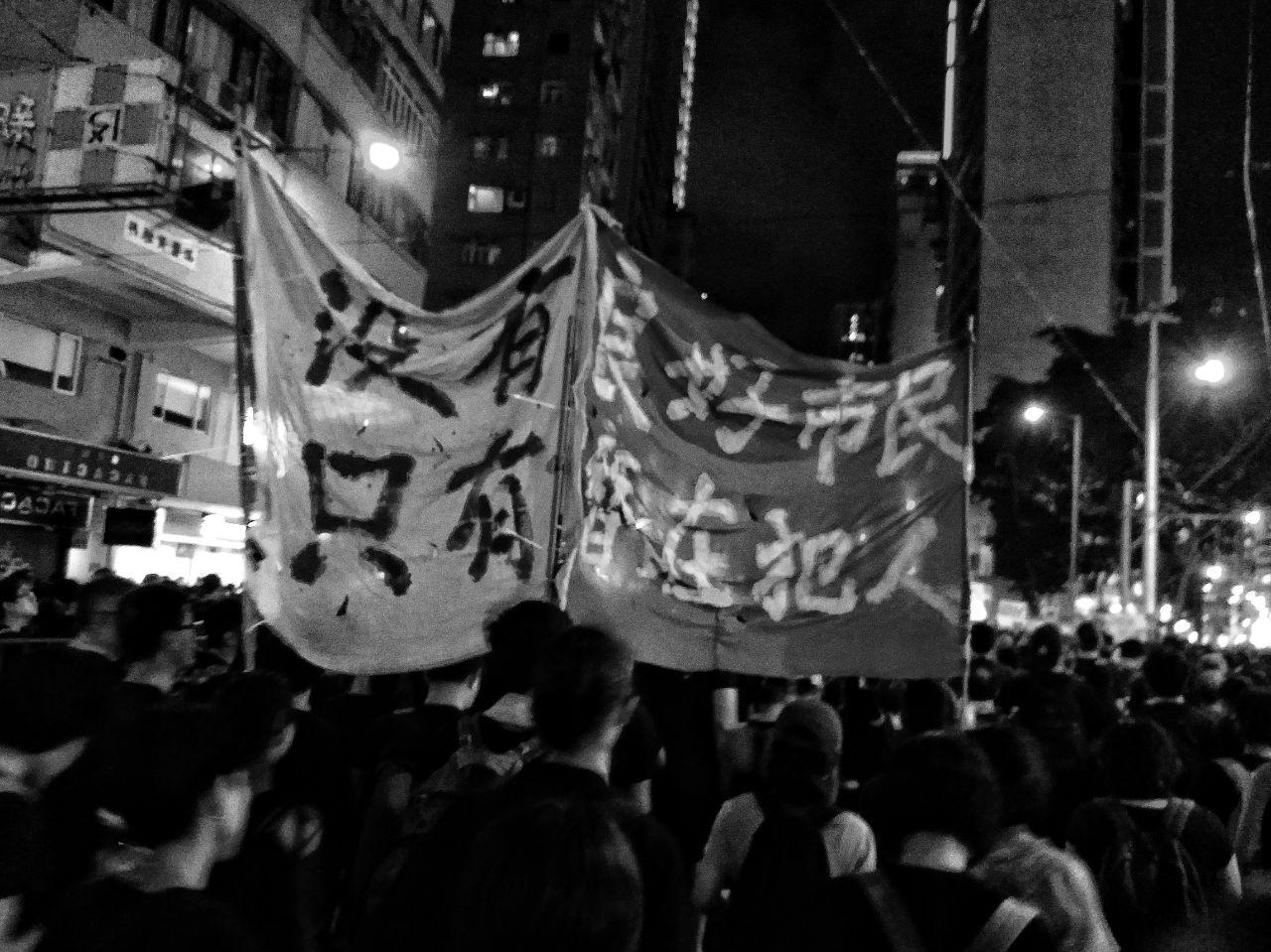
Our banner in the marches, which is usually found at the front of our drum squad. It reads “There are no ‘good citizens’, only potential criminals.” This banner was made in response to propaganda circulated by pro-Beijing establishmentarian political groups in Hong Kong, assuring “good citizens” everywhere that extradition measures do not threaten those with a sound conscience who are quietly minding their own business. Photo by WWS from Tak Cheong Lane Collective.
If we understand “the left” as a political subject that situates questions of class struggle and labor at the center of its politics, it’s not entirely certain that such a thing even properly exists in Hong Kong. Of course, friends of ours run excellent blogs, and there are small grouplets and the like. Certainly, everybody talks about the wealth gap, rampant poverty, the capitalist class, the fact that we are all “打工仔” (jobbers, working folk) struggling to survive. But, as almost anywhere else, the primary form of subjectivity and identification that everyone subscribes to is the idea of citizenship in a national community. It follows that this imagined belonging is founded on negation, exclusion, and demarcation from the Mainland. You can only imagine the torture of seeing the tiresome “I’m a Hong Konger, not Chinese!” t-shirts on the subway, or hearing “Hong Kongers add oil!” (essentially, “way to go!”) chanted ad nauseam for an entire afternoon during recent marches.
It should interest readers from abroad to know that the word “left” in Hong Kong has two connotations. Obviously, for the generation of our parents and their parents before them, “Left” means Communist. Which is why “Left” could refer to a businessman who is a Party member, or a pro-establishment politician who is notoriously pro-China. For younger people, the word “Left” is a stigma (often conjugated with “plastic,” a word in Cantonese that sounds like “dickhead”) attached to a previous generation of activists who were involved in a prior sequence of social struggle—including struggles to prevent the demolition of Queen’s Ferry Pier in Central, against the construction of the high-speed Railway going through the northeast of Hong Kong into China, and against the destruction of vast tracts of farmland in the North East territories, all of which ended in demoralizing defeat. These movements were often led by articulate spokespeople—artists or NGO representatives who forged tactical alliances with progressives in the pan-democratic movement. The defeat of these movements, attributed to their apprehensions about endorsing direct action and their pleas for patience and for negotiations with authority, is now blamed on that generation of activists. All the rage and frustration of the young people who came of age in that period, heeding the direction of these figureheads who commanded them to disperse as they witnessed yet another defeat, yet another exhibition of orchestrated passivity, has progressively taken a rightward turn. Even secondary and university student bodies that have traditionally been staunchly center-left and progressive have become explicitly nationalist.
One crucial tenet among this generation, emerging from a welter of disappointments and failures, is a focus on direct action, and a consequent refusal of “small group discussions,” “consensus,” and the like. This was a theme that first appeared in the umbrella movement—most prominently in the Mong Kok encampment, where the possibilities were richest, but where the right was also, unfortunately, able to establish a firm foothold. The distrust of the previous generation remains prevalent. For example, on the afternoon of June 12, in the midst of the street fights between police and protesters, several members of a longstanding social-democratic party tasked themselves with relaying information via microphone to those on the front lines, telling them where to withdraw to if they needed to escape, what holes in the fronts to fill, and similar information. Because of this distrust of parties, politicians, professional activists and their agendas, many ignored these instructions and instead relied on word of mouth information or information circulating in online messaging groups.1
It’s no exaggeration to say that the founding myth of this city is that refugees and dissidents fled communist persecution to build an oasis of wealth and freedom, a fortress of civil liberties safeguarded by the rule of law. In view of that, on a mundane level, it could be said that many in Hong Kong already understand themselves as being in revolt, in the way they live and the freedoms they enjoy—and that they consider this identity, however vacuous and tenuous it may be, to be a property that has to be defended at all costs. It shouldn’t be necessary to say much here about the fact that much of the actual ecological “wealth” that constitutes this city—its most interesting (and often poorest) neighborhoods, a whole host of informal clubs, studios, and dwelling places situated in industrial buildings, farmland in the Northeast territories, historic walled villages and rural districts—are being pillaged and destroyed piece by piece by the state and private developers, to the resounding indifference of these indignant citoyens.
In any case, if liberals are successful in deploying their Cold War language about the need to defend civil liberties and human rights from the encroaching Red Tide, and right-wing populist calls to defend the integrity of our identity also gain traction, it is for these deep-rooted and rather banal historical reasons. Consider the timing of this struggle, how it exploded when images of police brutalizing and arresting young students went viral—like a perfect repetition of the prelude to the umbrella movement. This happened within a week of the annual candlelight vigil commemorating those killed in the Tiananmen Massacre on June 4, 1989, a date remembered in Hong Kong as the day tanks were called in to steamroll over students peacefully gathering in a plea for civil liberties. It is impossible to overstate the profundity of this wound, this trauma, in the formation of the popular psyche; this was driven home when thousands of mothers gathered in public, in an almost perfect mirroring of the Tiananmen mothers, to publicly grieve for the disappeared futures of their children, now eclipsed in the shadow of the communist monolith. It stupefies the mind to think that the police—not once now, but twice—broke the greatest of all taboos: opening fire on the young.
In light of this, it would be naïve to suggest that anything significant has happened yet to suggest that to escaping the “chokehold” that you describe “scholarist” liberals and “citizenist” right-wingers maintaining on the narrative here. Both of these factions are simply symptoms of an underlying condition, aspects of an ideology that has to be attacked and taken apart in practice. Perhaps we should approach what is happening right now as a sort of psychoanalysis in public, with the psychopathology of our city exposed in full view, and see the actions we engage in collectively as a chance to work through traumas, manias, and obsessive complexes together. While it is undoubtedly dismaying that the momentum and morale of this struggle is sustained, across the social spectrum, by a constant invocation of the “Hong Kong people,” who are incited to protect their home at all costs, and while this deeply troubling unanimity covers over many problems,2 we accept the turmoil and the calamity of our time, the need to intervene in circumstances that are never of our own choosing. However bleak things may appear, this struggle offers a chance for new encounters, for the elaboration of new grammars.
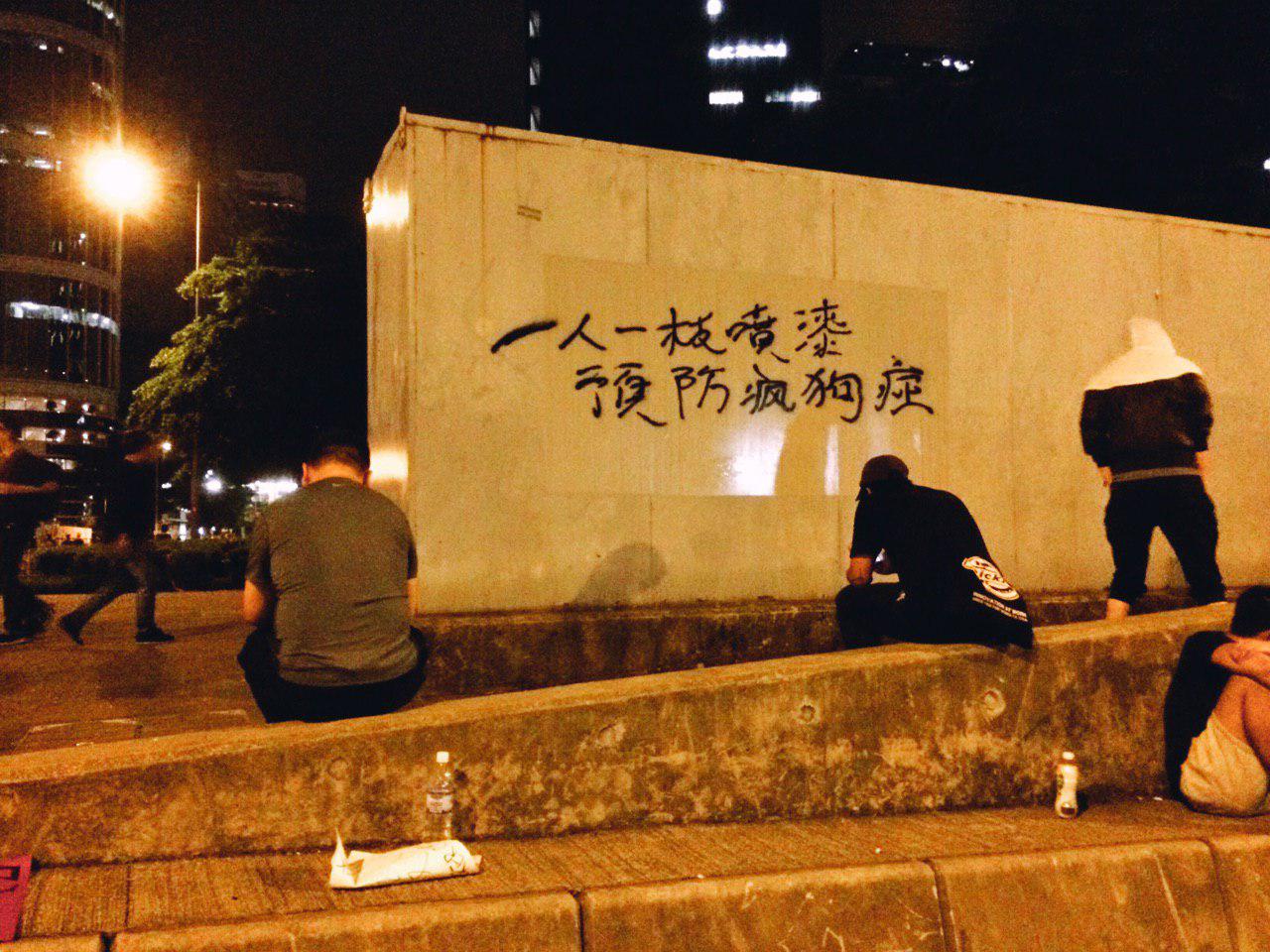
Graffiti seen in the road occupation in Admiralty near the government quarters, reading “Carry a can of paint with you, it’s a remedy for canine rabies.” Cops are popularly referred to as “dogs” here. Photo by WWS from Tak Cheong Lane Collective.
What has happened to the discourse of civility in the interlude between the umbrella movement and now? Did it contract, expand, decay, transform?
That’s an interesting question to ask. Perhaps the most significant thing that we can report about the current sequence that, astonishingly, when a small fringe of protesters attempted to break into the legislative council on June 9 following a day-long march, it was not universally criticized as an act of lunacy or, worse, the work of China or police provocateurs. Bear in mind that on June 9 and 12, the two attempts to break into the legislative council building thus far, the legislative assembly was not in session; people were effectively attempting to break into an empty building.
Now, much as we have our reservations about the effectiveness of doing such a thing in the first place,3 this is extraordinary, considering the fact that the last attempt to do so, which occurred in a protest against development in the North East territories shortly before the umbrella movement, took place while deliberations were in session and was broadly condemned or ignored.4 Some might suggest that the legacy of the Sunflower movement in Taiwan remains a big inspiration for many here; others might say that the looming threat of Chinese annexation is spurring the public to endorse desperate measures that they would otherwise chastise.
On the afternoon of June 12, when tens of thousands of people suddenly found themselves assaulted by riot police, scrambling to escape from barrages of plastic bullets and tear gas, nobody condemned the masked squads in the front fighting back against the advancing lines of police and putting out the tear gas canisters as they landed. A longstanding, seemingly insuperable gulf has always existed between the “peaceful” protesters (pejoratively referred to as “peaceful rational non-violent dickheads” by most of us on the other side) and the “bellicose” protesters who believe in direct action. Each side tends to view the other with contempt.
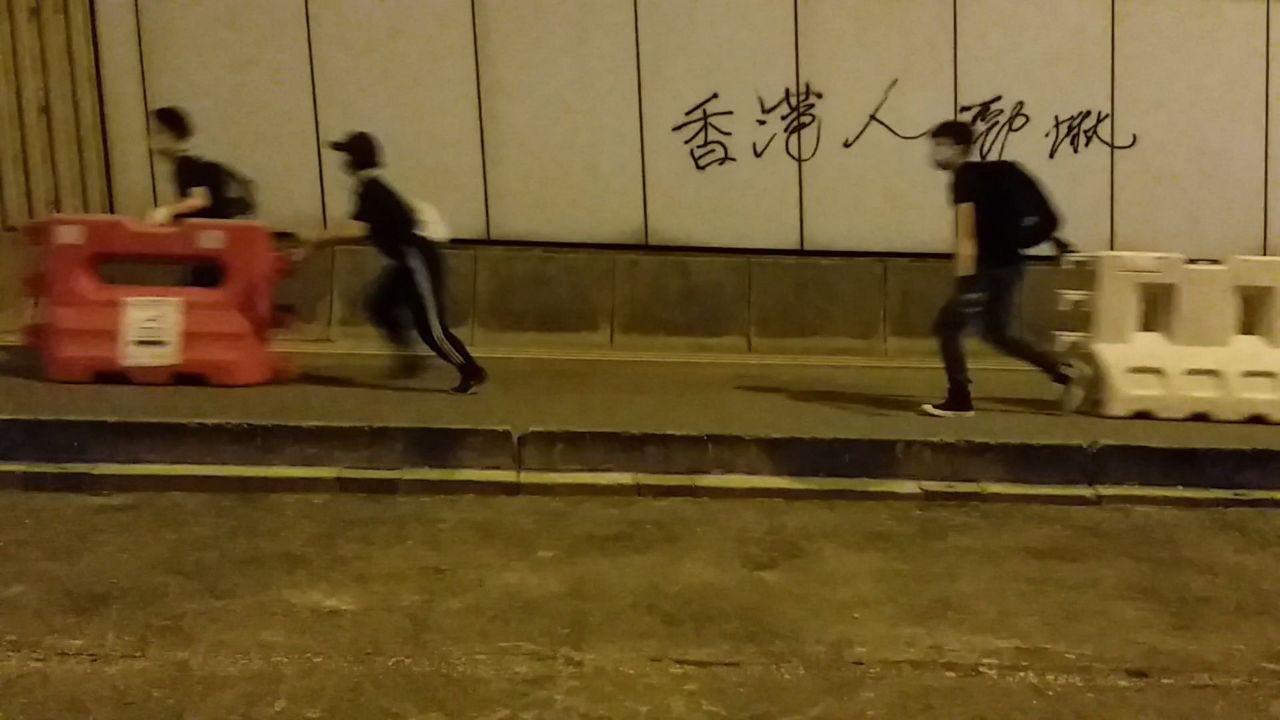
Protesters transporting materials to build barricades. The graffiti on the wall can be roughly (and liberally) translated as “Hong Kongers ain’t nuthin’ to fuck wit’.” Photo by WWS from Tak Cheong Lane Collective.
The online forum lihkg has functioned as a central place for young people to organize, exchange political banter, and circulate information relating to this struggle. For the first time, a whole host of threads on this site have been dedicated to healing this breach or at least cultivating respect for those who do nothing but show up for the marches every Sunday—if only because marches that number in the millions and bring parts of the city to a temporary standstill are a pretty big deal, however mind-numbingly boring they may be in actuality. The last time the marches were anywhere close to this huge, a Chief Executive stepped down and the amending of a law regarding freedom of speech was moved to the back burner. All manner of groups are attempting to invent a way to contribute to the struggle, the most notable of which is the congregation of Christians that have assembled in front of police lines at the legislative council, chanting the same hymn without reprieve for a week and a half. That hymn has become a refrain that will likely reverberate through struggles in the future, for better or worse.
Are there clear openings or lines of flight in this movement that would allow for interventions that undermine the power of the police, of the law, of the commodity, without producing a militant subject that can be identified and excised?
It is difficult to answer this question. Despite the fact that proletarians compose the vast majority of people waging this struggle—proletarians whose lives are stolen from them by soulless jobs, who are compelled to spend more and more of their wages paying rents that continue to skyrocket because of comprehensive gentrification projects undertaken by state officials and private developers (who are often one and the same)—you must remember that “free market capitalism” is taken by many to be a defining trait of the cultural identity of Hong Kong, distinguishing it from the “red” capitalism managed by the Communist Party. What currently exists in Hong Kong, for some people, is far from ideal; when one says “the rich,” it invokes images of tycoon monopolies—cartels and communist toadies who have formed a dark pact with the Party to feed on the blood of the poor.
So, just as people are ardent for a government and institutions that we can properly call “our own”—yes, including the police—they desire a capitalism that we can finally call “our own,” a capitalism free from corruption, political chicanery, and the like. It’s easy to chuckle at this, but like any community gathered around a founding myth of pioneers fleeing persecution and building a land of freedom and plenty from sacrifice and hard work… it’s easy to understand why this fixation exerts such a powerful hold on the imagination.
This is a city that fiercely defends the initiative of the entrepreneur, of private enterprise, and understands every sort of hustle as a way of making a living, a tactic in the tooth-and-nail struggle for survival. This grim sense of life as survival is omnipresent in our speech; when we speak of “working,” we use the term “搵食,” which literally means looking for our next meal. That explains why protesters have traditionally been very careful to avoid alienating the working masses by actions such as blockading a road used by busses transporting working stiffs back home.
While we understand that much of our lives are preoccupied with and consumed by work, nobody dares to propose the refusal of work, to oppose the indignity of being treated as producer-consumers under the dominion of the commodity. The police are chastised for being “running dogs” of an evil totalitarian empire, rather than being what they actually are: the foot soldiers of the regime of property.
What is novel in the current situation is that many people now accept that acts of solidarity with the struggle, however minute,5 can lead to arrest, and are prepared to tread this shifting line between legality and illegality. It is no exaggeration to say that we are witnessing the appearance of a generation that is prepared for imprisonment, something that was formerly restricted to “professional activists” at the forefront of social movements. At the same time, there is no existing discussion regarding what the force of law is, how it operates, or the legitimacy of the police and prisons as institutions. People simply feel they need to employ measures that transgress the law in order the preserve the sanctity of the Law, which has been violated and dishonored by the cowboys of communist corruption.
However, it is important to note that this is the first time that proposals for strikes in various sectors and general strikes have been put forward regarding an issue that is, on the surface of it, unrelated to labor.
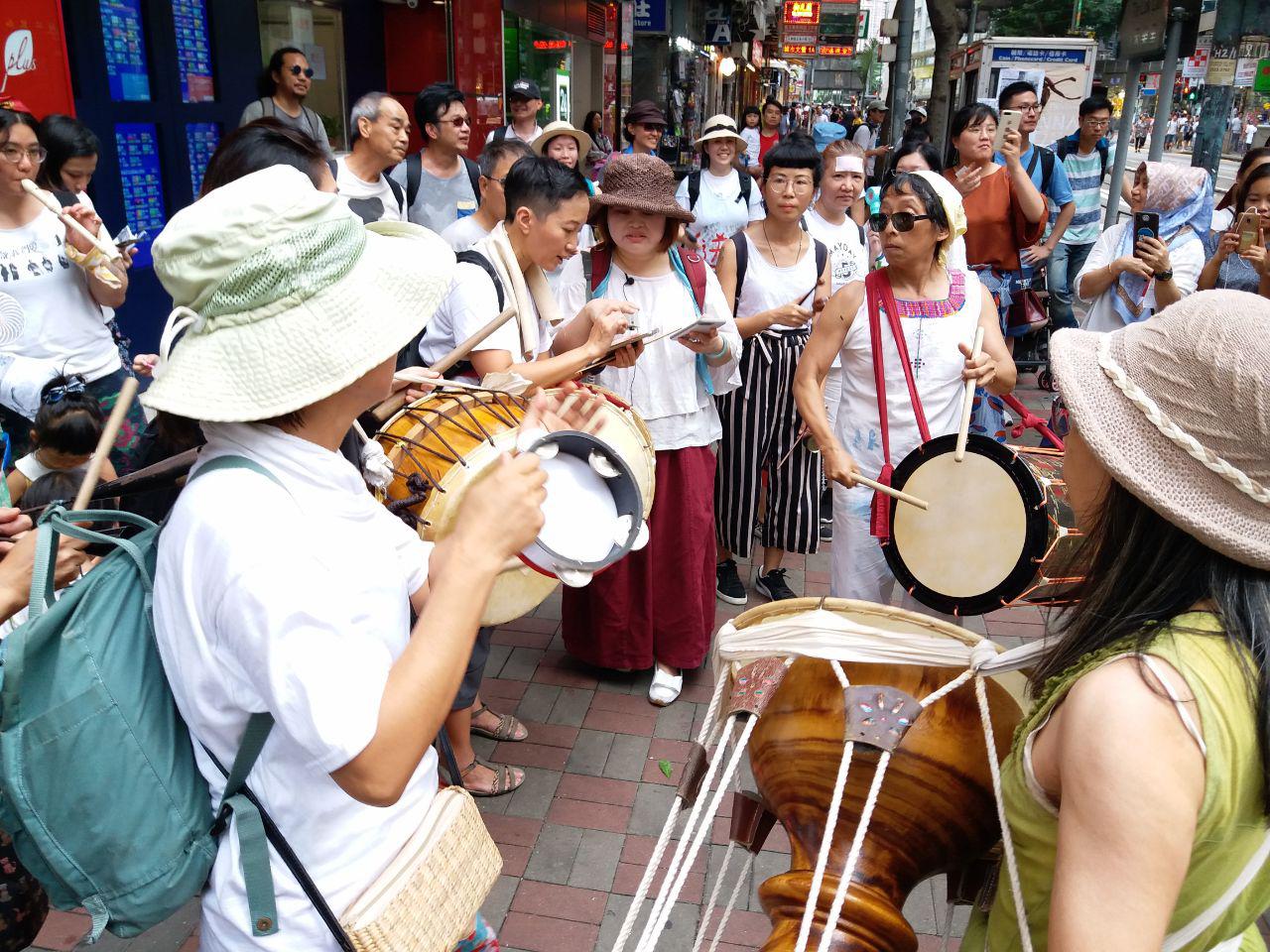
Our friends in the “Housewives Against Extradition” section of the march on June 9. The picture shows a group of housewives and aunties, many of whom were on the streets for the first time. Photo by WWS from Tak Cheong Lane Collective.
How do barricades and occupations like the one from a few days ago reproduce themselves in the context of Hong Kong?
Barricades are simply customary now. Whenever people gather en masse and intend to occupy a certain territory to establish a front, barricades are built quickly and effectively. There is a creeping sense now that occupations are becoming routine and futile, physically taxing and ultimately inefficient. What’s interesting in this struggle is that people are really spending a lot of time thinking about what “works,” what requires the least expenditure of effort and achieves the maximum effect in paralyzing parts of the city or interrupting circulation, rather than what holds the greatest moral appeal to an imagined “public” watching everything from the safety of the living room—or even, conversely, what “feels” the most militant.
There have been many popular proposals for “non-cooperative” quotidian actions such as jamming up an entire subway train by coordinating groups of friends to pack the cars with people and luggage for a whole afternoon, or cancelling bank accounts and withdrawing savings from savings accounts in order to create inflation. Some have spread suggestions regarding how to dodge paying taxes for the rest of your life. These might not seem like much, but what’s interesting is the relentless circulation of suggestions from all manner of quarters, from people with varying kinds of expertise, about how people can act on their own initiative where they live or work and in their everyday lives, rather than imagining “the struggle” as something that is waged exclusively on the streets by masked, able-bodied youth.
Whatever criticisms anybody might have about what has happened thus far, this formidable exercise in collective intelligence is really incredibly impressive—an action can be proposed in a message group or on an anonymous message board thread, a few people organize to do it, and it’s done without any fuss or fanfare. Forms circulate and multiply as different groups try them out and modify them.
In the West, Leninists and Maoists have been screaming bloody murder about “CIA Psyop” or “Western backed color revolution.” Have hegemonic forces in Hong Kong invoked the “outside agitator” theme on the ground at a narrative level?
Actually, that is the official line of the Chief Executive, who has repeatedly said that she regards the events of the past week as riotous behavior incited by foreign interests that are interested in conducting a “color revolution” in the city. I’m not sure if she would repeat that line now that she has apologized publicly for “creating contradictions” and discord with her decisions, but all the same—it’s hilarious that tankies share the exact same opinion as our formal head of state.
It’s an open secret that various pro-democracy NGOs, parties, and thinktanks receive American funding. It’s not some kind of occult conspiracy theory that only tankies know about. But these tankies are suggesting that the platform that coordinates the marches—a broad alliance of political parties, NGOs, and the like—is also the ideological spearhead and architect of the “movement,” which is simply a colossal misunderstanding. That platform has been widely denounced, discredited, and mocked by the “direct action” tendencies that are forming all around us, and it is only recently that, as we said above, there are slightly begrudging threads on the Internet offering them indirect praise for being able to coordinate marches that actually achieve something. If only tankies would stop treating everybody like mindless neo-colonial sheep acting at the cryptic behest of Western imperialist intelligence.
That said, it would be dishonest if we failed to mention that, alongside threads on message boards discussing the niceties of direct action tactics abroad, there are also threads alerting everyone to the fact that voices in the White House have expressed their disapproval for the law. Some have even celebrated this. Also, there is a really wacky petition circulating on Facebook to get people to appeal to the White House for foreign intervention. I’m sure one would see these sorts of things in any struggle of this scale in any non-Western city. They aren’t smoking guns confirming imperialist manipulation; they are fringe phenomena that are not the driving force behind events thus far.
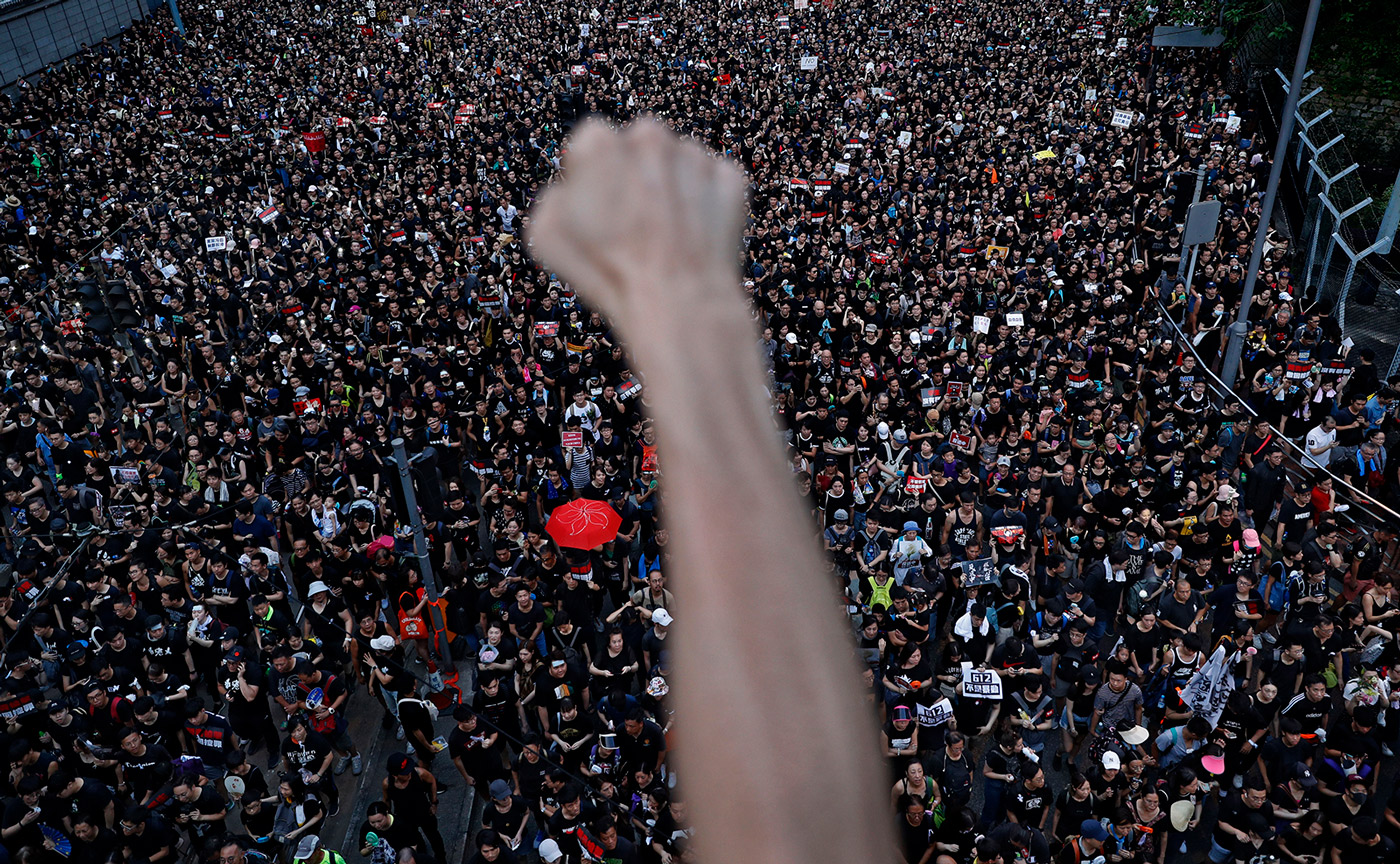
Have any slogans, neologisms, new slang, popular talking points, or funny phrases emerged that are unique to the situation?
Yes, lots, though we’re not sure how we would go about translating them. But the force that is generating these memes, that is inspiring all these Whatsapp and Telegram stickers and catchphrases, is actually the police force.
Between shooting people in the eye with plastic bullets, flailing their batons about, and indiscriminately firing tear gas canisters at peoples’ heads and groins, they also found the time to utter some truly classic pearls that have made their way on to t-shirts. One of these bons mots is the rather unfortunate and politically incorrect “liberal cunt.” In the heat of a skirmish between police and protesters, a policeman called someone at the frontlines by that epithet. All our swear words in Cantonese revolve around male and female genitalia, unfortunately; we have quite a few words for private parts. In Cantonese, this formulation doesn’t sound as sensible as it does in English. Said together in Cantonese, “liberal” and “cunt” sounds positively hilarious.
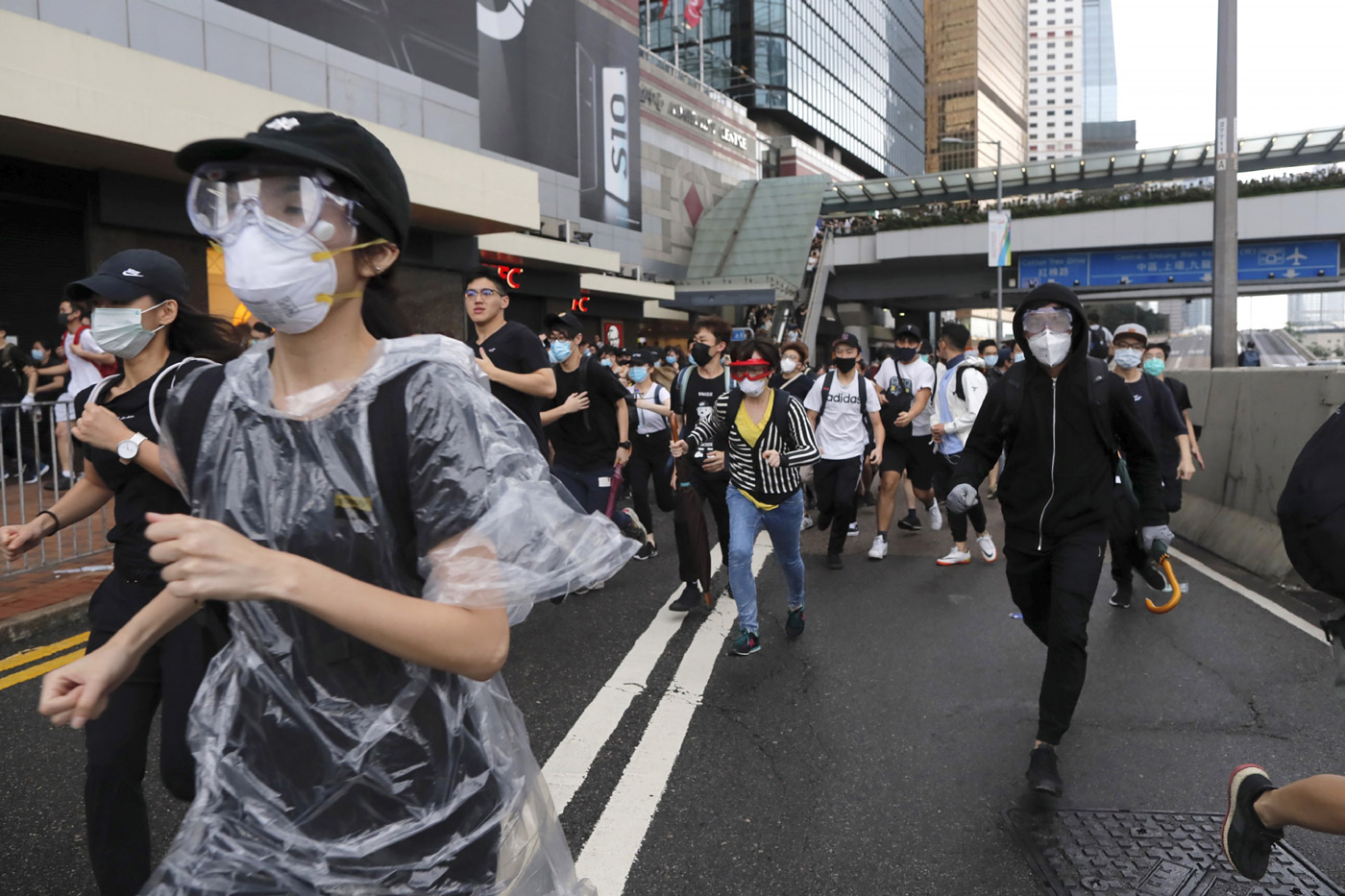
Does this upheaval bear any connections to the fishball riots or Hong Kong autonomy from a few years ago?
The “fishball riots” were a demonstrative lesson in many ways, especially for people like us, who found ourselves spectators situated at some remove from the people involved. It was a paroxysmic explosion of rage against the police, a completely unexpected aftershock from the collapse of the umbrella movement. An entire party, the erstwhile darlings of right-wing youth everywhere, “Hong Kong Indigenous,” owes its whole career to this riot. They made absolutely sure that everyone knew they were attending, showing up in uniform and waving their royal blue flags at the scene. They were voted into office, disqualified, and incarcerated—one of the central members is now seeking asylum in Germany, where his views on Hong Kong independence have apparently softened considerably in the course of hanging out with German Greens. That is fresh in the memory of folks who know that invisibility is now paramount.
What effect has Joshua Wong’s release had?
We are not sure how surprised readers from overseas will be to discover, after perhaps watching that awful documentary about Joshua Wong on Netflix, that his release has not inspired much fanfare at all. Demosisto are now effectively the “Left Plastic” among a new batch of secondary students.
Are populist factions functioning as a real force of recuperation?
All that we have written above illustrates how, while the struggle currently escapes the grasp of every established group, party, and organization, its content is populist by default. The struggle has attained a sprawling scale and drawn in a wide breadth of actors; right now, it is expanding by the minute. But there is little thought given to the fact that many of those who are most obviously and immediately affected by the law will be people whose work takes place across the border—working with and providing aid to workers in Shenzhen, for instance.
Nobody is entirely sure what the actual implications of the law are. Even accounts written by professional lawyers vary quite widely, and this gives press outlets that brand themselves as “voices of the people”6 ample space to frame the entire issue as simply a matter of Hong Kong’s constitutional autonomy being compromised, with an entire city in revolt against the imposition of an all-encompassing surveillance state.
Perusing message boards and conversing with people around the government complex, you would think that the introduction of this law means that expressions of dissent online or objectionable text messages to friends on the Mainland could lead to extradition. This is far from being the case, as far as the letter of the law goes. But the events of the last few years, during which booksellers in Hong Kong have been disappeared for selling publications banned on the Mainland and activists in Hong Kong have been detained and deprived of contact upon crossing the border, offer little cause to trust a party that is already notorious for cooking up charges and contravening the letter of the law whenever convenient. Who knows what it will do once official authorization is granted.
Paranoia invariably sets in whenever the subject of China comes up. On the evening of June 12, when the clouds of tear gas were beginning to clear up, the founder of a Telegram message group with 10,000+ active members was arrested by the police, who commanded him to unlock his phone. His testimony revealed that he was told that even if he refused, they would hack his phone anyway. Later, the news reported that he was using a Xiaomi phone at the time. This news went viral, with many commenting that his choice of phone was both bold and idiotic, since urban legend has it that Xiaomi phones not only have a “backdoor” that permits Xiaomi to access the information on every one of its phones and assume control of the information therein, but that Xiaomi—by virtue of having its servers in China—uploads all information stored on its cloud to the database of party overlords. It is futile to try to suggest that users who are anxious about such things can take measures to seal backdoors, or that background information leeching can be detected by simply checking the data usage on your phone. Xiaomi is effectively regarded as an expertly engineered Communist tracking device, and arguments about it are no longer technical, but ideological to the point of superstition.
This “post-truth” dimension of this struggle, compounded with all the psychopathological factors that we enumerated above, makes everything that is happening that much more perplexing, that much more overwhelming. For so long, fantasy has been the impetus for social struggle in this city—the fantasy of a national community, urbane, free-thinking, civilized and each sharing in the negative freedoms that the law provides, the fantasy of electoral democracy… Whenever these affirmative fantasies are put at risk, they are defended and enacted in public, en masse, and the sales for “I Am Hong Konger” [sic] go through the roof.
This is what gives the proceedings a distinctly conservative, reactionary flavor, despite how radical and decentralized the new forms of action are. All we can do as a collective is seek ways to subvert this fantasy, to expose and demonstrate its vacuity in form and content.
At this time, it feels surreal that everybody around us is so certain, so clear about what they need to do—oppose this law with every means that they have available to them—while the reasons for doing so remain hopelessly obscure. It could very well be the case that this suffocating opacity is our lot for the time being, in this phase premised upon more action, less talk, on the relentless need to keep abreast of and act on the flow of information that is constantly accelerating around us.
In so many ways, what we see happening around us is a fulfillment of what we have dreamt of for years. So many bemoan the “lack of political leadership,” which they see as a noxious habit developed over years of failed movements, but the truth is that those who are accustomed to being protagonists of struggles, including ourselves as a collective, have been overtaken by events. It is no longer a matter of a tiny scene of activists concocting a set of tactics and programs and attempting to market them to the public. “The public” is taking action all around us, exchanging techniques on forums, devising ways to evade surveillance, to avoid being arrested at all costs. It is now possible to learn more about fighting the police in one afternoon than we did in a few years.
In the midst of this breathless acceleration, is it possible to introduce another rhythm, in which we can engage in a collective contemplation of what has become of us, and what we are becoming as we rush headlong into the tumult?
As ever, we stand here, fighting alongside our neighbors, ardently looking for friends.

Hand-written statements by protesters, weathered after an afternoon of heavy rain. Photo by WWS from Tak Cheong Lane Collective.
Further Reading
Other Voices from the Anti-Extradition Movement
-
After discussing the preliminary draft of this article, one of us raised reservations about this statement, stating that it wasn’t an entirely accurate representation of events. While quite a few people ignored the directions of those holding the microphones, others were receptive to them, taking them into account while also receiving information streams from various messaging channels. One must remember that a significant proportion of people who have taken to the streets are out there for the first time, and quite often can be overwhelmed by panic—there were scenes, for example, of young people who broke down in fits of tears in front of the police lines, and had to be taken out of the line of fire by others. It is also worth describing our own experiences on June 21, when several blockades of government buildings were organized by protesters following the failure of the chief executive to respond to a popular ultimatum. That afternoon involved hundreds of protesters who were quick to propose, discuss, evaluate, and make decisions in a spontaneous fashion, giving the lie to suggestions that this new generation simply spurns discussion for fear of co-optation. Of course, there are dubious phenomena in this endeavor to create decision-making forms in a popular struggle—the occupation of the entrance of the Hong Kong police headquarters, which stretched into the evening, turned into a bit of a debacle when a debate over whether the occupation should continue was put to a contested vote. Also, one wonders whether the acephalous, amorphous nature of the movement, composed of novices who are making things up as they go, renders it vulnerable to capture—on the afternoon of the 21st, it was Joshua Wong who gathered scattered units of protesters together to assemble in front of the police headquarters. We suspect that this had more to do with the fact that everybody had showed up to the area without any clear idea of what they could do, rather than the person of Joshua Wong himself, but one still wonders. ↩
-
In reflecting on the problems concealed by the apparent unanimity of the “Hong Kong people,” we might start by asking who that framework suggests that this city is for, who comprises this imaginary subject. We have seen Nepalese and Pakistani brothers and sisters on the streets, but they hesitate to make their presence known for fear of being accused of being thugs employed by the police. ↩
-
“The places of institutional power exert a magnetic attraction on revolutionaries. But when the insurgents manage to penetrate parliaments, presidential palaces, and other headquarters of institutions, as in Ukraine, in Libya or in Wisconsin, it’s only to discover empty places, that is, empty of power, and furnished without any taste. It’s not to prevent the “people” from “taking power” that they are so fiercely kept from invading such places, but to prevent them from realizing that power no longer resides in the institutions. There are only deserted temples there, decommissioned fortresses, nothing but stage sets—real traps for revolutionaries.” –The Invisible Committee, To Our Friends ↩
-
Incidentally, that attempt was a good deal more spontaneous and successful. The police had hardly imagined that crowds of people who had sat peacefully with their heads in their hands feeling helpless while the developments were authorized would suddenly start attempting to rush the council doors by force, breaking some of the windows. ↩
-
On the night of June 11, young customers in a McDonald’s in Admiralty were all searched and had their identity cards recorded. On June 12, a video went viral showing a young man who was transporting a box of bottled water to protesters being brutalized by a squad of policemen with batons. ↩
-
To give two rather different examples, this includes the populist, xenophobic, and vehemently anti-Communist Apple Daily, and the “Hong Kong Free Press,” an independent English online rag of the “angry liberal” stripe run by expatriates that has an affinity for young localist/nativist leaders. ↩


